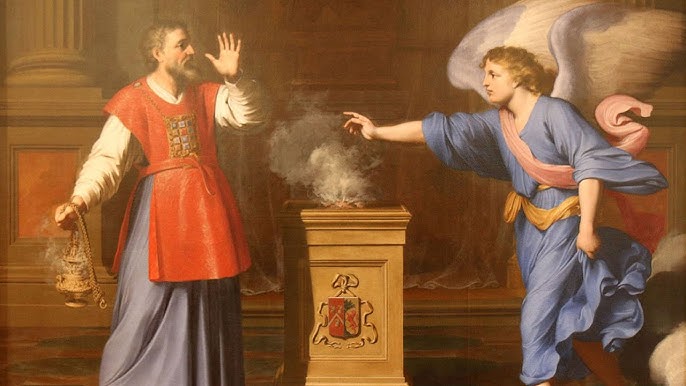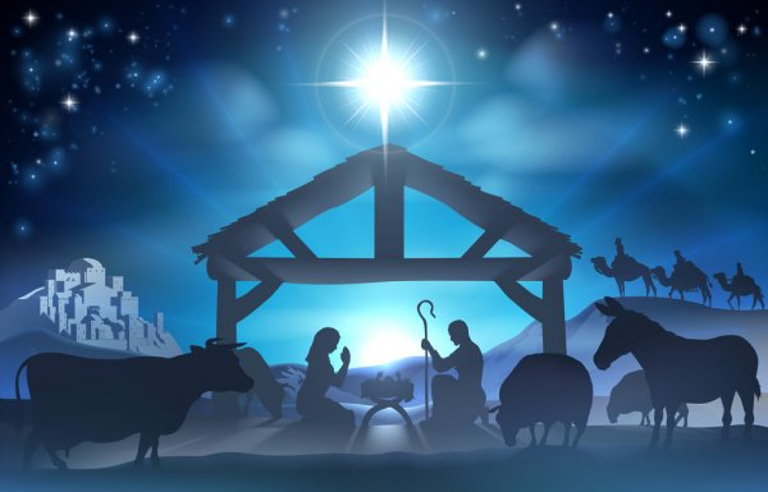The Role of Gabriel in the Nativity
Uncover the meaning behind Gabriel's name and mission. Learn how this archangel shaped the Nativity narrative and God's plan. Discover more!
Grace Callahan
12/24/202410 min read


Gabriel, one of the few named archangels in the Bible, plays a pivotal role in the Nativity narrative. His name means "God is my strength," and he serves as God's messenger, delivering crucial announcements about the births of two significant figures in God's salvation plan—John the Baptist and Jesus Christ. Gabriel’s appearances are not just moments of divine revelation but are also filled with deep theological significance. Let’s explore the key passages where Gabriel appears and reflect on his character and purpose.
Gabriel
Gabriel, the messenger of God, plays a significant role in the events leading up to the birth of Jesus. His appearance in Luke 1:11-20 reveals his unique status as an angel who stands in the very presence of God, entrusted with delivering pivotal messages of divine significance. This first New Testament encounter with Gabriel emphasizes his authority, power, and the weight of the good news he brings.
Gabriel’s Role in the Announcement to Zechariah
Zechariah, a priest from the division of Abijah, was chosen by lot to offer incense in the temple of the Lord. As he performed his sacred duties, Gabriel appeared to him near the altar of incense—a place symbolizing prayer and intercession (Luke 1:10-11). The angel’s presence startled Zechariah, and Gabriel reassured him with the words often associated with angelic visitations: “Do not be afraid” (Luke 1:13).
Gabriel's message was extraordinary: Zechariah’s wife, Elizabeth, who was considered barren and was advanced in age, would conceive a son. This son, John the Baptist, would be a key figure in God’s redemptive plan, preparing the way for the coming Messiah. Gabriel described John’s future greatness, highlighting that he would:
Be “great in the sight of the Lord” (Luke 1:15).
Be filled with the Holy Spirit from the womb (Luke 1:15).
Turn many in Israel back to God (Luke 1:16).
Fulfill the prophecy of Malachi, coming “in the spirit and power of Elijah” to prepare the people for the Lord (Luke 1:17; Malachi 4:5-6).
Gabriel’s Authority and Response to Doubt
When Zechariah doubted Gabriel’s message, citing his and Elizabeth’s old age, Gabriel did not hesitate to assert his authority:
“I am Gabriel. I stand in the presence of God, and I have been sent to speak to you and to tell you this good news.” (Luke 1:19)
This statement underscores Gabriel’s divine commission. His words carry the weight of God’s truth, and his presence reflects his role as a servant deeply involved in the unfolding of God’s plans. To reinforce his message and to discipline Zechariah for his disbelief, Gabriel declared that Zechariah would be mute until the prophecy was fulfilled. This act served as both a sign and a consequence, demonstrating that God’s promises would come to pass despite human doubt.
Characteristics of Gabriel in This Encounter
Faithfulness to God’s Mission: Gabriel’s role as a divine messenger highlights his obedience and dedication to delivering God’s words with precision and authority.
Bearer of Joyful News: Gabriel’s announcement carried not only miraculous hope for Zechariah and Elizabeth but also the joy of salvation for all, as John the Baptist would pave the way for the Messiah.
Rebuke Coupled with Promise: While Gabriel disciplined Zechariah for his doubt, he also reassured him that the promised child would bring fulfillment and joy. This balance shows Gabriel’s alignment with both God’s justice and grace.
Power to Confirm God’s Word: By making Zechariah mute, Gabriel demonstrated the divine power entrusted to him, ensuring that Zechariah would witness the fulfillment of the prophecy firsthand.
A Broader Understanding of Gabriel’s Role
Gabriel’s appearance to Zechariah is part of a larger narrative of hope and divine intervention. His announcement not only restored joy to Zechariah and Elizabeth but also initiated the chain of events leading to the Messiah’s coming. Gabriel would later appear to Mary to announce the birth of Jesus, further emphasizing his role as a key figure in proclaiming God’s plan of redemption (Luke 1:26-38).
Through his interactions, Gabriel reveals the nature of God’s kingdom: it is a place of fulfilled promises, miraculous hope, and a call to faith. For Zechariah, this encounter was a turning point—an invitation to trust in the faithfulness of God, even when His plans seem impossible.
Gabriel and Mary
Gabriel’s encounter with Mary in Luke 1:26–38 is one of the most significant moments in the New Testament, as it announces the incarnation of Jesus Christ. This event highlights Gabriel’s role as a divine messenger, entrusted with delivering profound news of hope and salvation. It also reveals Mary’s extraordinary faith and submission to God’s plan.
Gabriel’s Greeting and Mary’s Favor with God
Gabriel begins by greeting Mary with a declaration of her unique status in God’s plan:
“Greetings, you who are highly favored! The Lord is with you.” (Luke 1:28, NIV)
This salutation is filled with honor and affirmation, signifying Mary’s special place in God’s redemptive story. Gabriel’s words highlight her favor, not due to her own merit, but as a result of God’s grace. Mary, though initially troubled and uncertain, is reassured by Gabriel’s calm and respectful demeanor.
Gabriel then reveals the extraordinary news:
“You will conceive and give birth to a son, and you are to call him Jesus. He will be great and will be called the Son of the Most High. The Lord God will give him the throne of his father David, and he will reign over Jacob’s descendants forever; his kingdom will never end.” (Luke 1:31-33, NIV)
In this announcement, Gabriel ties Jesus’ birth to key Messianic prophecies:
Jesus as the Son of the Most High emphasizes His divine nature (Psalm 2:7).
Jesus as the heir to David’s throne fulfills the promise of an eternal kingdom made in 2 Samuel 7:12-13.
Meaning "The Lord saves") underscores His mission to redeem humanity (Matthew 1:21).
Mary’s Question and Gabriel’s Explanation
When Mary asks how this will happen, given her virginity, Gabriel does not rebuke her but provides a respectful and miraculous explanation:
“The Holy Spirit will come on you, and the power of the Most High will overshadow you. So the holy one to be born will be called the Son of God.” (Luke 1:35, NIV)
Gabriel reveals the mystery of the incarnation, explaining that the conception of Jesus will be a work of the Holy Spirit. The term “overshadow” recalls the imagery of God’s presence in the Old Testament, such as the cloud of glory that filled the tabernacle (Exodus 40:34-35). This highlights the divine origin of Jesus, fully God and fully man, conceived in purity and holiness.
To reassure Mary further, Gabriel shares the miraculous news of Elizabeth’s pregnancy:
“Even Elizabeth your relative is going to have a child in her old age, and she who was said to be unable to conceive is in her sixth month. For no word from God will ever fail.” (Luke 1:36-37, NIV)
Gabriel uses Elizabeth’s situation as evidence of God’s power and faithfulness, showing that nothing is impossible for Him. This not only strengthens Mary’s faith but also connects her story to God’s broader redemptive plan.
Mary’s Response of Faith and Submission
Mary responds with profound humility and faith:
“I am the Lord’s servant. May your word to me be fulfilled.” (Luke 1:38, NIV)
Her response exemplifies complete trust in God’s plan, even though it would bring significant personal challenges. Mary’s willingness to embrace her role as the mother of the Messiah reveals her deep faith and obedience. She becomes a model of discipleship, surrendering her will to God’s purposes.
Gabriel’s Character in This Encounter
A Messenger of Grace: Gabriel’s greeting to Mary is filled with respect and affirmation, reflecting God’s love and favor toward her.
Revealer of Divine Mysteries: Gabriel explains the miracle of the incarnation with clarity and reverence, pointing to the work of the Holy Spirit and the fulfillment of prophecy.
Encourager of Faith: By sharing Elizabeth’s story and affirming God’s faithfulness, Gabriel strengthens Mary’s confidence in the Lord.
Witness to God’s Sovereignty: Gabriel’s message underscores that God’s plans will always come to fruition, regardless of human limitations.
Theological Significance
Gabriel’s visit to Mary is a pivotal moment in salvation history. It marks the beginning of the fulfillment of God’s promises to redeem humanity through the Messiah. The angel’s announcement highlights key truths:
Jesus is the divine Son of God and the eternal King.
His coming is the result of God’s miraculous power and grace.
God’s word is unbreakable, and His plans are unstoppable.
This passage also reflects the mystery of the incarnation: the union of divine and human nature in the person of Jesus Christ. Gabriel’s words emphasize that the Savior’s birth is entirely the work of God, a gift of grace for the world.
An Invitation to Reflect
Gabriel’s interaction with Mary invites us to reflect on our own response to God’s calling. Like Mary, we are called to trust in God’s plans, even when they seem impossible or beyond our understanding. Her humble acceptance of Gabriel’s message reminds us that faith and obedience open the door to God’s extraordinary work in our lives.
Gabriel and Joseph
Gabriel’s visit to Joseph in Matthew 1:18-25 plays a crucial role in confirming and solidifying Joseph’s part in God’s plan of redemption. Although Gabriel’s appearance to Joseph is less dramatic than his encounters with Zechariah and Mary, it is no less significant. Gabriel’s words provide reassurance, guidance, and prophetic clarity, enabling Joseph to take on his role as the earthly father of Jesus with confidence and faith.
Gabriel’s Role as a Reassurer and Guide
Joseph faces a deeply personal and spiritual dilemma when he learns of Mary’s pregnancy. Being a righteous and compassionate man, Joseph decides to divorce Mary quietly to spare her public disgrace (Matthew 1:19). Gabriel intervenes with a message of reassurance, delivered in a dream:
“Joseph son of David, do not be afraid to take Mary home as your wife, because what is conceived in her is from the Holy Spirit.” (Matthew 1:20, NIV)
Reassurance: Gabriel acknowledges Joseph’s fear and dispels it, assuring him that Mary’s pregnancy is a divine act, not a betrayal. This comfort enables Joseph to see beyond his immediate concerns and embrace God’s plan.
Guidance: Gabriel provides clear instructions for Joseph to proceed with the marriage, emphasizing his role in protecting and caring for Mary and the child. Gabriel’s message helps Joseph transition from doubt to decisive action.
Joseph’s Role as the Son of David
Gabriel addresses Joseph as the "son of David," reminding him of his lineage and its connection to Messianic prophecies. This is significant because Joseph’s legal guardianship of Jesus places Him within the royal lineage of King David, fulfilling the prophecy that the Messiah would come from David’s line (2 Samuel 7:12-16, Isaiah 11:1). By invoking this title, Gabriel emphasizes Joseph’s critical role in the unfolding of God’s redemptive plan.
Revealing Jesus’ Identity and Mission
Gabriel reveals the identity and purpose of the child Mary is carrying:
“She will give birth to a son, and you are to give him the name Jesus, because he will save his people from their sins.” (Matthew 1:21, NIV)
The Name "Jesus": Derived from the Hebrew Yeshua (meaning "The Lord saves"), the name signifies Jesus’ mission to bring salvation to humanity. This ties directly to His role as the Savior.
The Promise of Salvation: Gabriel explains that Jesus’ purpose is not limited to political or earthly deliverance but extends to the ultimate salvation from sin—a fulfillment of God’s covenant with His people.
Connecting Prophecy to Fulfillment
Gabriel’s message also connects the birth of Jesus to Old Testament prophecy. He quotes Isaiah 7:14:
“The virgin will conceive and give birth to a son, and they will call him Immanuel” (which means ‘God with us’).” (Matthew 1:23, NIV)
By referencing this prophecy, Gabriel demonstrates the coherence of God’s plan, weaving together the promises of the Old Testament with their fulfillment in the New Testament. The name Immanuel emphasizes the profound truth that Jesus’ coming signifies God’s presence with humanity in a tangible and personal way.
Joseph’s Obedience and Faith
Joseph’s response to Gabriel’s message is one of immediate obedience and faith:
“When Joseph woke up, he did what the angel of the Lord had commanded him and took Mary home as his wife. But he did not consummate their marriage until she gave birth to a son. And he gave him the name Jesus.” (Matthew 1:24-25, NIV)
Faith in Action: Joseph trusts Gabriel’s words, setting aside his fears and doubts to follow God’s will.
Protection and Provision: By taking Mary as his wife, Joseph provides her with social and legal protection, safeguarding her and the unborn child.
Obedience in Naming Jesus: Joseph fulfills Gabriel’s instructions by naming the child Jesus, publicly acknowledging his role as Jesus’ earthly father and affirming the child’s divine mission.
Gabriel’s Character in This Encounter
Compassionate Messenger: Gabriel addresses Joseph’s fear and confusion with kindness and clarity, showing God’s care for His servants.
Prophetic Interpreter: Gabriel bridges the Old Testament and New Testament, affirming that Jesus’ birth fulfills God’s promises.
Encourager of Obedience: Gabriel’s words inspire Joseph to embrace his role with faith and courage, guiding him to act in accordance with God’s plan.
Theological Significance
Gabriel’s appearance to Joseph underscores several key truths about God’s plan of salvation:
God’s Sovereignty: Every detail, from Joseph’s lineage to the prophecy of Isaiah, aligns with God’s eternal plan.
Jesus as Savior and Immanuel: Gabriel’s message reveals Jesus’ dual role as the one who saves humanity from sin and brings God’s presence among His people.
The Importance of Obedience: Joseph’s faithful response serves as an example of trusting God, even in challenging and uncertain circumstances.
An Invitation to Reflect
Gabriel’s visit to Joseph challenges us to trust God’s plan, even when it disrupts our expectations. Like Joseph, we may face moments of doubt and fear, but God’s reassurance and guidance are always available. This passage invites us to embrace our role in God’s story with faith and obedience, knowing that His promises are sure and His plans are good.
Conclusion
Gabriel is a prominent angel in the Bible, who plays a crucial role in the Nativity story. He is the messenger of God who announces the births of John the Baptist and Jesus Christ and reveals their names and missions. He interacts with Zechariah, Mary, and Joseph, and shows different aspects of his character and purpose. He is faithful, authoritative, powerful, rebuking, promising, gracious, respectful, revealing, assuring, fulfilling, humble, obedient, blessing, compassionate, reassuring, comforting, confirming, guiding, protecting, and connecting. He is a model of service and communication, and a witness of God's grace and truth.








